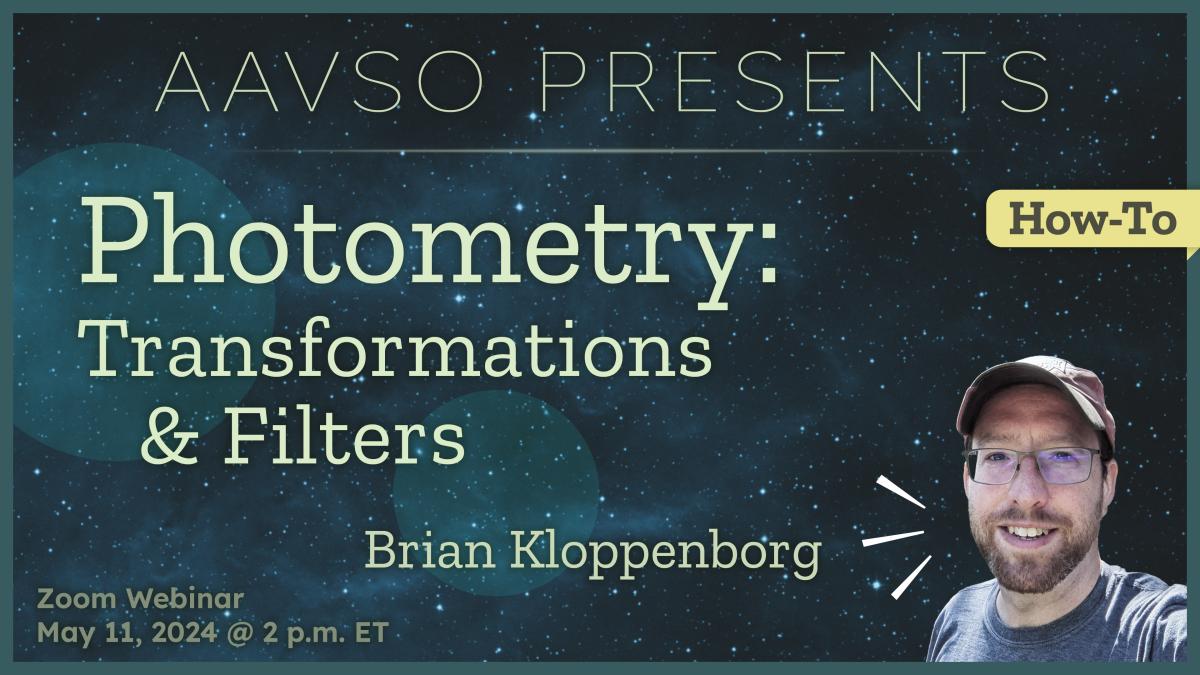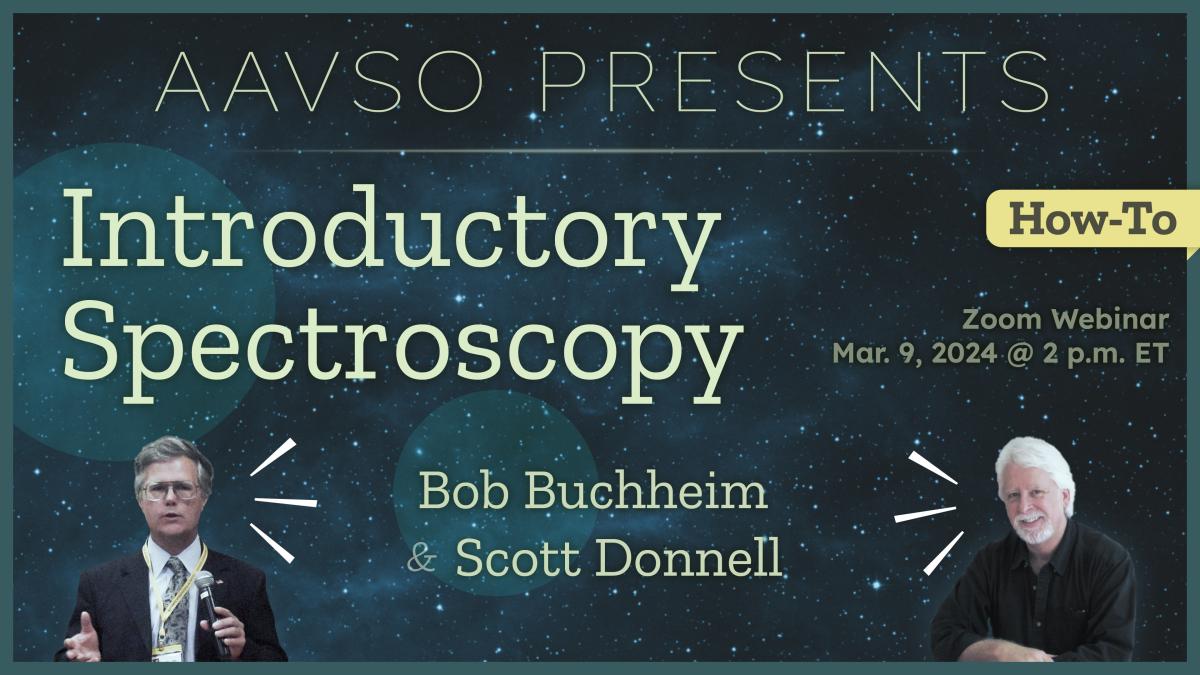
AAVSO webinars engage the diverse variable star community with opportunities to learn from expert instructors, ask questions, and meet others with the same interest. Every webinar ends with an audience-driven Q&A, and the in-depth discussions sparked often reveal information that you just won't find anywhere else.
We have many webinars planned, with topics ranging from the fundamentally practical to the wonderfully specific. We’d love to see you there!
Upcoming Webinars
Pandora’s Box: How NASA and Citizen Scientists Help Avert Disaster
May 3, 2025 @ 2:00 p.m. Eastern Time
SESSION SPONSORSHIP AVAILABLE

Last month, Dr. Waalkes gave a presentation on how stellar activity could drastically alter the interpretation of an exoplanet's atmospheric composition. This month, join Dr. Rob Zellem (NASA Goddard Space Flight Center) as he talks about NASA's Pandora smallsat mission, which is scheduled to launch no earlier than Fall 2025 and will monitor >=20 transiting exoplanets and their host stars to disentangle stellar activity from the planet's atmospheric signal. Pandora's efforts will help enhance the science returns of NASA missions like Hubble and JWST. He will also present how citizen scientists and amateur astronomers can become involved and already are directly contributing to the Pandora mission and other NASA efforts.
Coming Soon
There will be two webinars in June, introducing the AAVSO's special interest groups.
Any cost?
Our webinars are free and open to the public! We believe strongly in the importance of keeping our events easy to access, enabling people all over the world to obtain a quality education in variable star astronomy.
When?
We host at least one webinar per month, sometimes more. You can view the schedule of upcoming webinars above. Webinars always begin at 2:00 p.m. Eastern Time. Here's what that means in other timezones:
| US Standard Time | (November–March) | |||
|---|---|---|---|---|
| UTC | EST [UTC-5] |
CST [UTC-6] |
MST [UTC-7] |
PST [UTC-8] |
| 19:00 | 2:00 p.m. | 1:00 p.m. | 12:00 noon | 11:00 a.m. |
| US Daylight Time | (April–October) | |||
| UTC | EDT [UTC-4] |
CDT [UTC-5] |
MDT [UTC-6] |
PDT [UTC-7] |
| 18:00 | 2:00 p.m. | 1:00 p.m. | 12:00 noon | 11:00 a.m. |
Past Webinars
M Dwarf Starspots & Transiting Exoplanets
April 5, 2025 @ 2:00 p.m. Eastern Time

The discovery and characterization of exoplanet atmospheres is mired in the challenge of disentangling planetary characteristics from the complex signatures of stellar activity. For stars cooler than the Sun, spots on their surface can be cool enough that molecular absorption appears in the stellar spectrum and can be mistaken for absorption in a planetary atmosphere. Will’s research addresses this with a combination of space- and ground-based observations of M dwarfs with transiting planets, focusing on modeling the stellar photosphere alongside the transit. In this talk, Will discusses the challenges of understanding planets transiting spotted stars, and the role that multi-color photometry plays in characterizing starspots.
.
Deciphering Eclipsing Binary Systems
March 1, 2025 @ 2:00 p.m. Eastern Time

ESA’s PLATO mission will use its 26 cameras to study terrestrial exoplanets in orbits up to the habitable zone of Sun-like stars. PLATO will also characterize planets' host stars by studying tiny light variations in the starlight it receives. The analysis of the PLATO data will require more sophisticated stellar models than are available today.
In this talk, Dr. Pierre Maxted (Keele University) will describe the on-going effort by the PLATO stellar science team to calibrate the next generation of stellar models using observations of well-studied "benchmark" stars, and the role that citizen scientists can play in gathering data to characterize benchmark stars in eclipsing binary systems.
.
The Latest News from SNEWS
February 1, 2025 @ 2:00 p.m. Eastern Time

Professor Dan Milisavljevic (Purdue University) will review and update plans for a coordinated global response to the next supernova in our Milky Way galaxy. The first alert that the "Big One" has happened will come from the Supernova Early Warning System (SNEWS), which is a network of neutrino detectors around the world. The neutrinos will arrive minutes to hours ahead of the first photons, which gives observers little time to locate and monitor the star as the explosion is happening.
.
Recognizing AAVSO’s All Stars
January 11, 2025 @ 2:00 p.m. Eastern Time
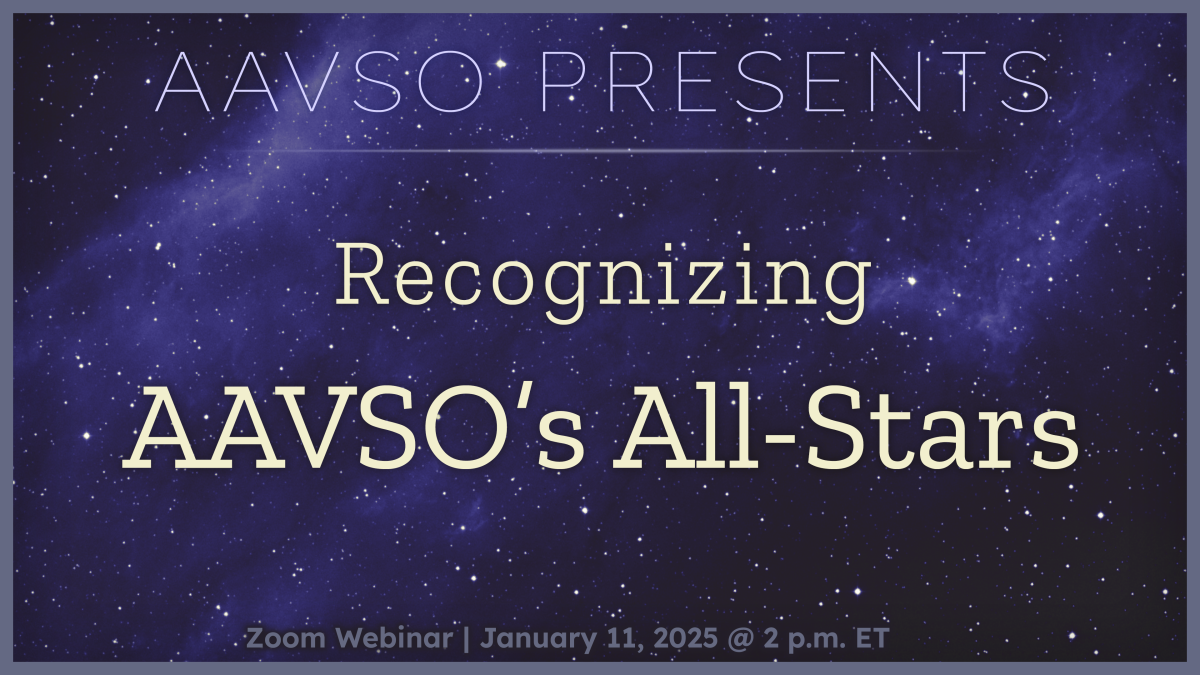
Join us for a special webinar celebrating our stellar volunteers!
The star of this webinar is our vibrant community. Join us to learn about our volunteers' valuable work, and the impressive impact of their observations and contributions. The discussion will touch on all aspects of the AAVSO, making this an ideal opportunity to learn more about the organization. You might even meet a new friend in the chat!
During one segment of this webinar, we intend to try something new: spotlighting audience members so that they can unmute and share how they are involved with the AAVSO.
Things I Thought I’d Never See
December 7, 2024 @ 2:00 p.m. Eastern Time
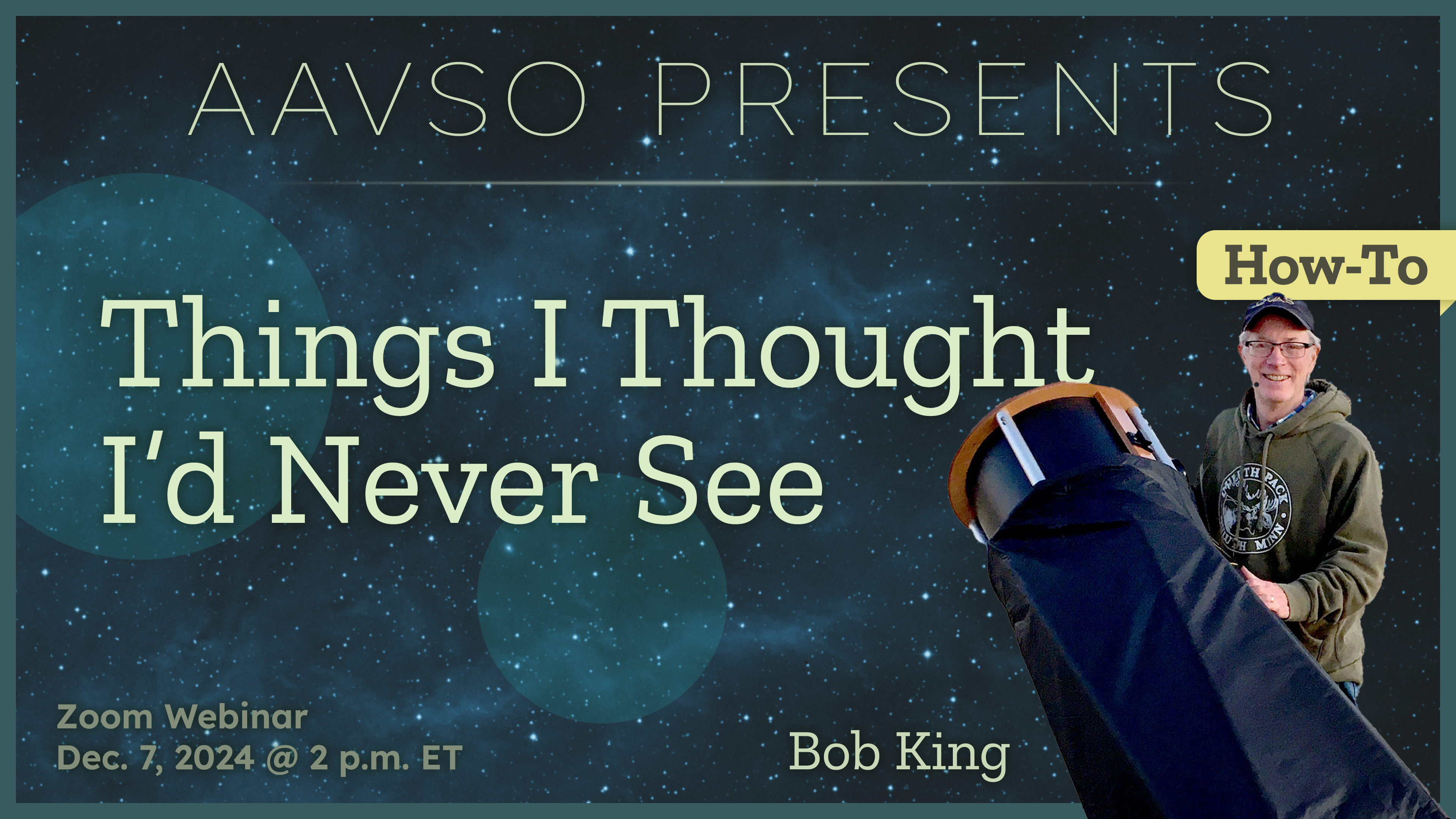
Bob King fell in love with the night sky when he was a kid, and he loves to share his passion with people of all ages through teaching and public observing. His long-time association with the AAVSO has seen him observe the most remote and exotic places in the universe—including “visits” to quasars, blazars and supernovae. In this webinar, Bob will demonstrate techniques for coaxing out faint transients near the limit of vision or shrouded in extragalactic haze. He’ll also discuss the importance of using up-to-date charts, photographs and websites to assist in the quest to see the ends of the cosmos.
Bob is a community educator and writes for Sky & Telescope’s magazine and website. He also pens the long-time blog Astro Bob he started in 2008, and has been an AAVSO member since 1982.
Mapping Wide Binaries using Pulsation Timing Variations
October 26, 2024 @ 2:00 p.m. Eastern Time
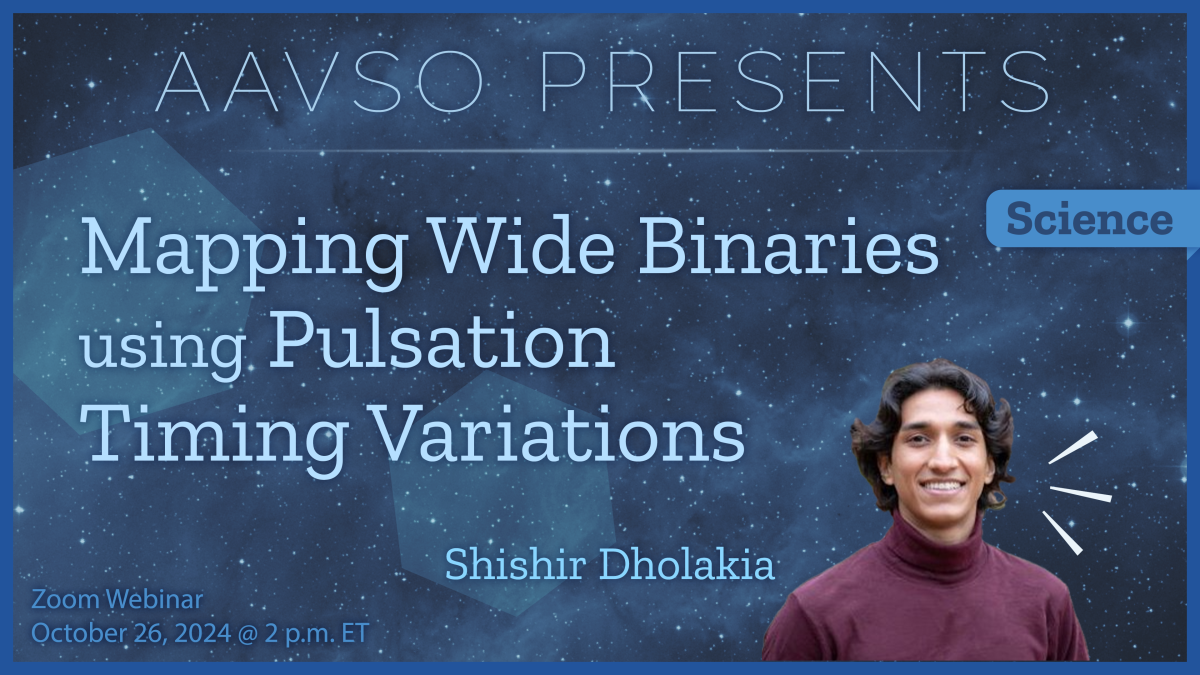
Shishir Dholakia has been doing something exciting: using TESS light curves to accurately map the orbits of widely separated binaries. His secret? Pulsation Timing Variations, caused by the speed-of-light delay as each component swings through space. Join us on the cutting edge of research as Shishir offers an inside view into this novel project!
Meet the Candidates for AAVSO’s FY25 Election
October 2, 2024 @ 2:00 p.m. Eastern Time
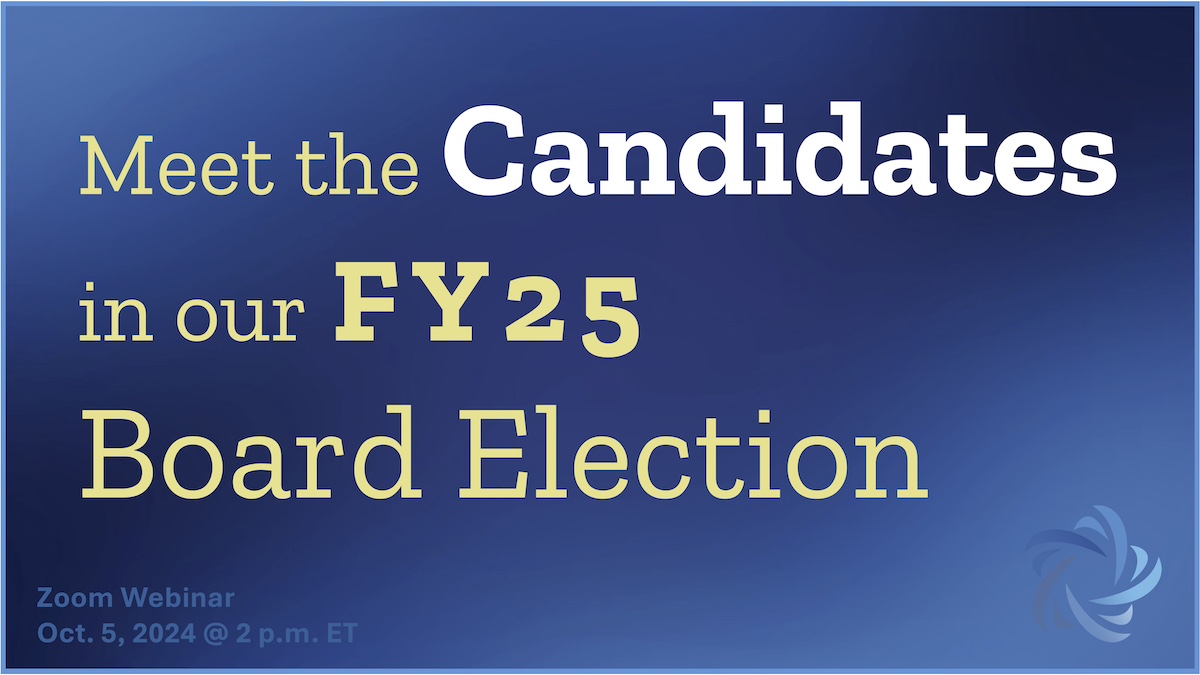
Join us as we hear from each of the candidates running in the AAVSO's FY25 Board election. Each candidate will discuss their own background, running platform, and thoughts on the future of the AAVSO.
Introduction to Exoplanet Observing
September 14, 2024 @ 2:00 p.m. Eastern Time
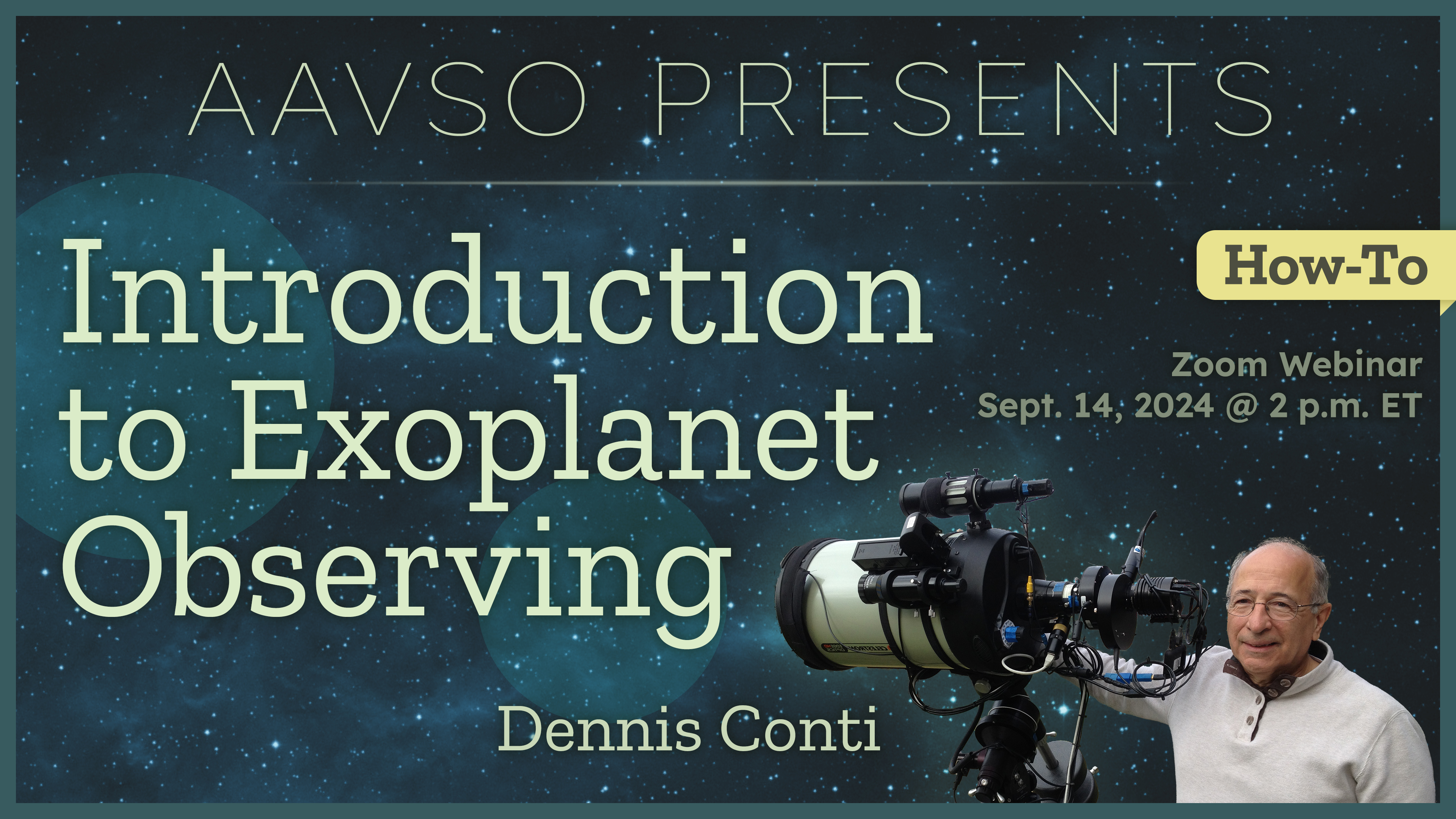
Interested in learning how to detect a planet orbiting a distant star? And doing so from your own backyard telescope? This webinar will provide an overview of the instrumentation, software, and processes required to detect exoplanets using the transit method. For astro-imagers in particular, the transition to exoplanet observing offers an opportunity to use your acquired skills and equipment to advance exoplanet research, while adding new excitement to your observing
experiences.
Although amateur astronomers have conducted their own exoplanet observations for several years, their contributions to recent NASA exoplanet missions such as TESS have been particularly impactful. We’ll review how you can be part of a team with professional astronomers discovering new worlds outside our solar system.
An Overview of Exoplanet Watch
August 10, 2024 @ 2:00 p.m. Eastern Time
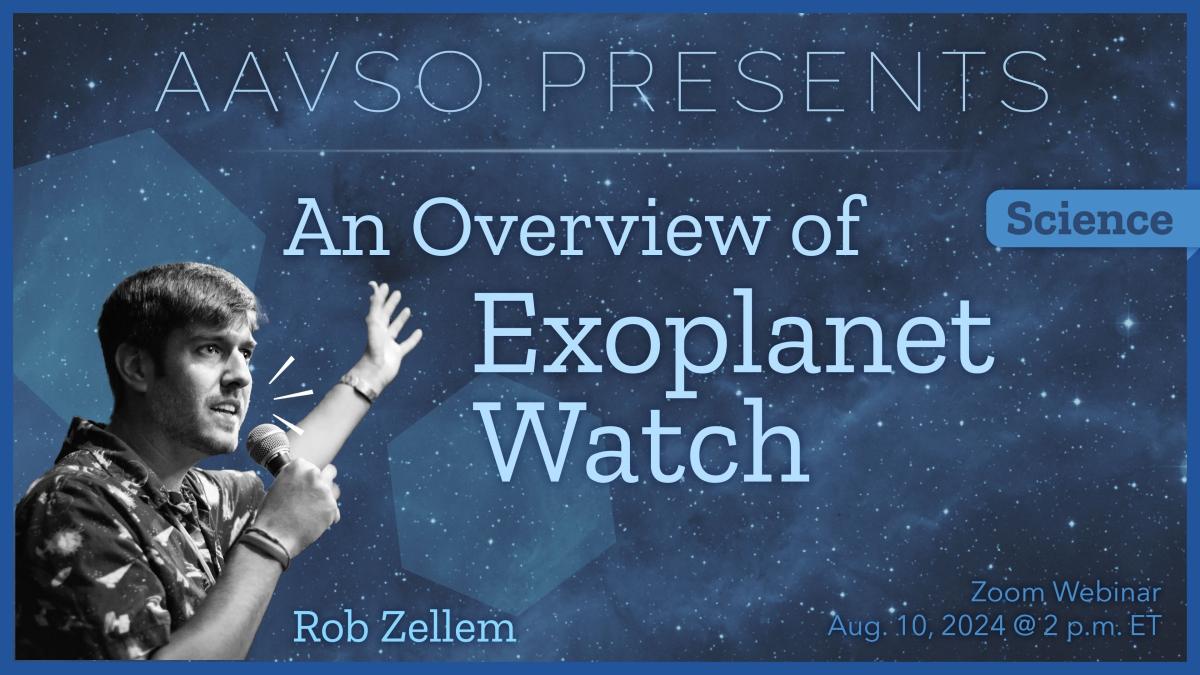
Dr. Rob Zellem, an astrophysicist at NASA’s Goddard Space Flight Center, will present an overview of Exoplanet Watch. This citizen science project allows folks, even those without telescopes, to aid researchers in observing transiting exoplanets to help ensure the efficient use of NASA resources, like Hubble and JWST. He'll also give a workshop demonstration of their data reduction code, EXOTIC, on the Google Colab.
The AAVSO-SNEWS Campaign
July 13, 2024 @ 2:00 p.m. Eastern Time
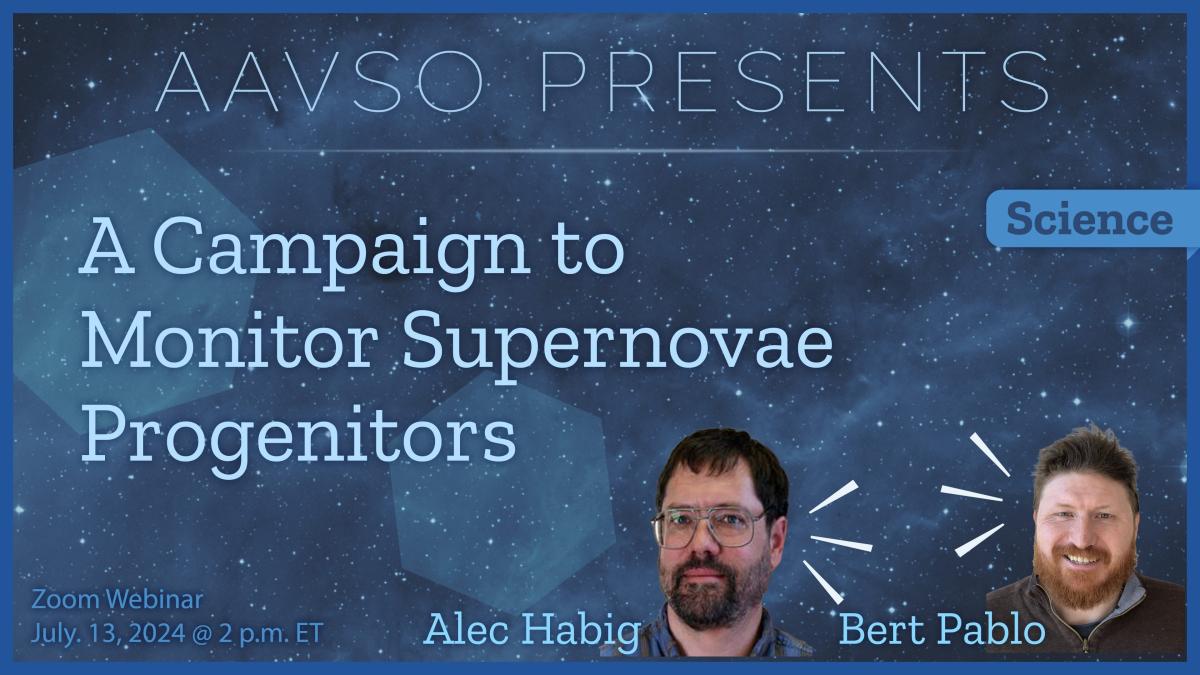
The AAVSO and the SuperNova Early Warning System team (SNEWS) are collaborating to monitor bright potential supernova progenitors. The targets are broadly distributed across the sky and all types of observing may be used, so this exciting campaign offers any interested observer the opportunity to contribute.
This webinar looks at the progress to date, and will feature talks from Professor Alec Habig, University of Minnesota, and Dr. Bert Pablo, AAVSO's Staff Astronomer.
Section Spotlight: Spectroscopy, HEN, and PEP
June 29, 2024 @ 2:00 p.m. Eastern Time
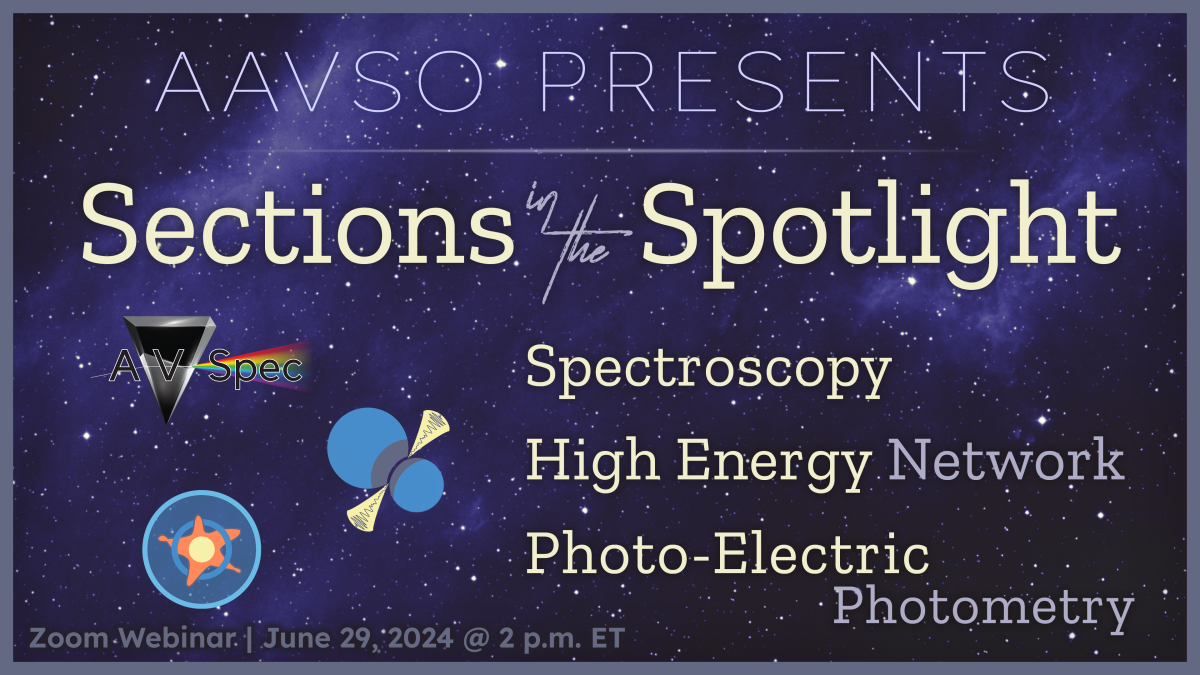
This webinar will feature brief talks from three AAVSO Sections: Cataclysmic Variables, AAVSOnet, and Short Period Pulsators.
The session will include a discussion of the AAVSO's Section system, and ways to participate.
Why should I register for this webinar?
If recurrent novae make your heart beat fast, you’ll find a place among friends in the Cataclysmic Variables Section, one of the AAVSO's most popular.
Those who prefer cluster variables and High-Amplitude Delta Scutis will be interested in the SPP Section's ongoing research projects.
And, if you like the sound of collecting unlimited data with 24-inch remote telescopes, you won't want to miss the presentation by the AAVSOnet Section.
Section Spotlight: CVs, AAVSOnet and SPPs
June 22, 2024 @ 2:00 p.m. Eastern Time
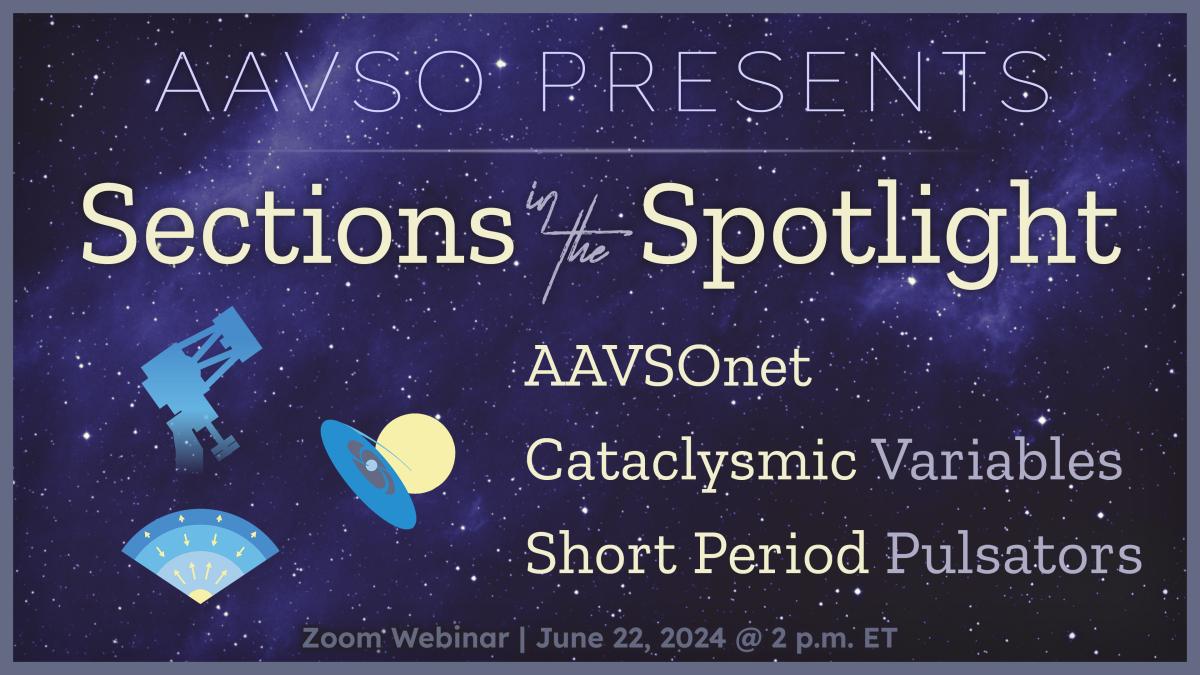
his webinar will feature brief talks from three AAVSO Sections: Cataclysmic Variables, AAVSOnet, and Short Period Pulsators.
The session will include a discussion of the AAVSO's Section system, and ways to participate.
Why should I register for this webinar?
If recurrent novae make your heart beat fast, you’ll find a place among friends in the Cataclysmic Variables Section, one of the AAVSO's most popular.
Those who prefer cluster variables and High-Amplitude Delta Scutis will be interested in the SPP Section's ongoing research projects.
And, if you like the sound of collecting unlimited data with 24" remote telescopes, you won't want to miss the presentation by the AAVSOnet Section.
Section Spotlight: Exoplanet, YSOs and I&E
June 8, 2024 @ 2:00 p.m. Eastern Time
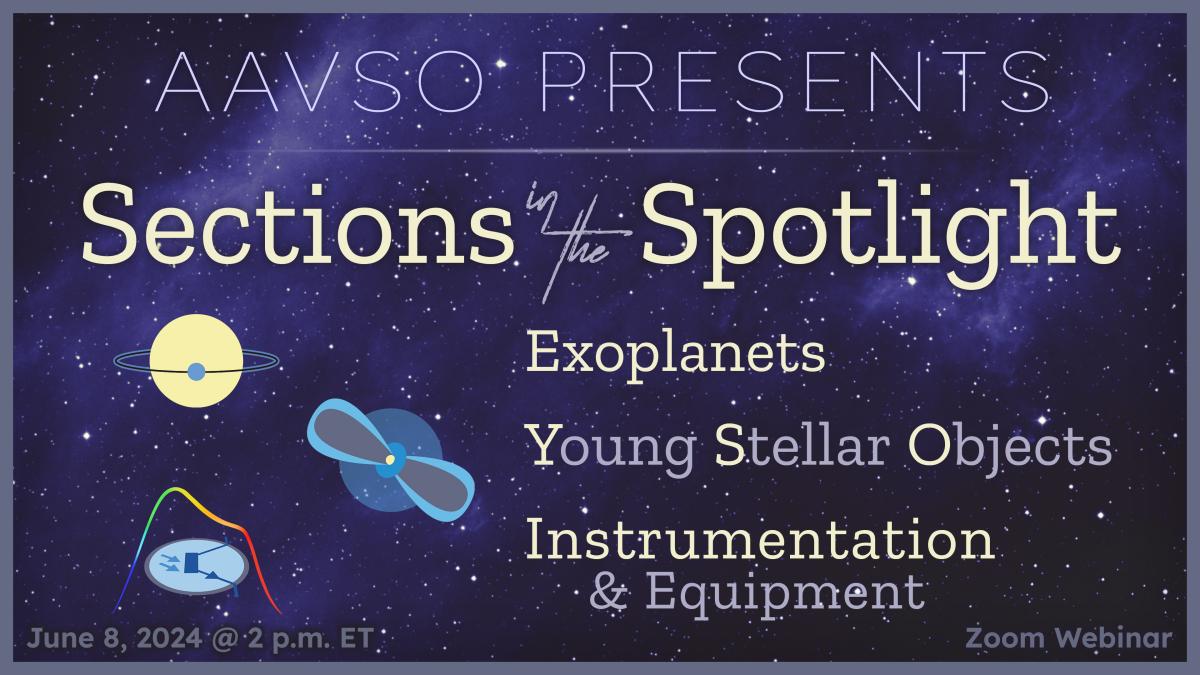
This webinar will feature brief talks from three AAVSO Sections: Exoplanet, Young Stellar Objects, and Instrumentation & Equipment.
The session will include a discussion of the AAVSO's Section system, and ways to participate.
Why should I register for this webinar?
If you enjoy observing exoplanets or monitoring protostars, you'll be very interested to hear about the ongoing studies conducted by the Exoplanet Section and Young Stellar Objects Section.
If you're curious about smart telescopes, or looking to swap DIY equipment plans, the Instrumentation & Equipment Section is just the group for you.
Section Spotlight: Solar, EBs and LPVs
June 1, 2024 @ 2:00 p.m. Eastern Time
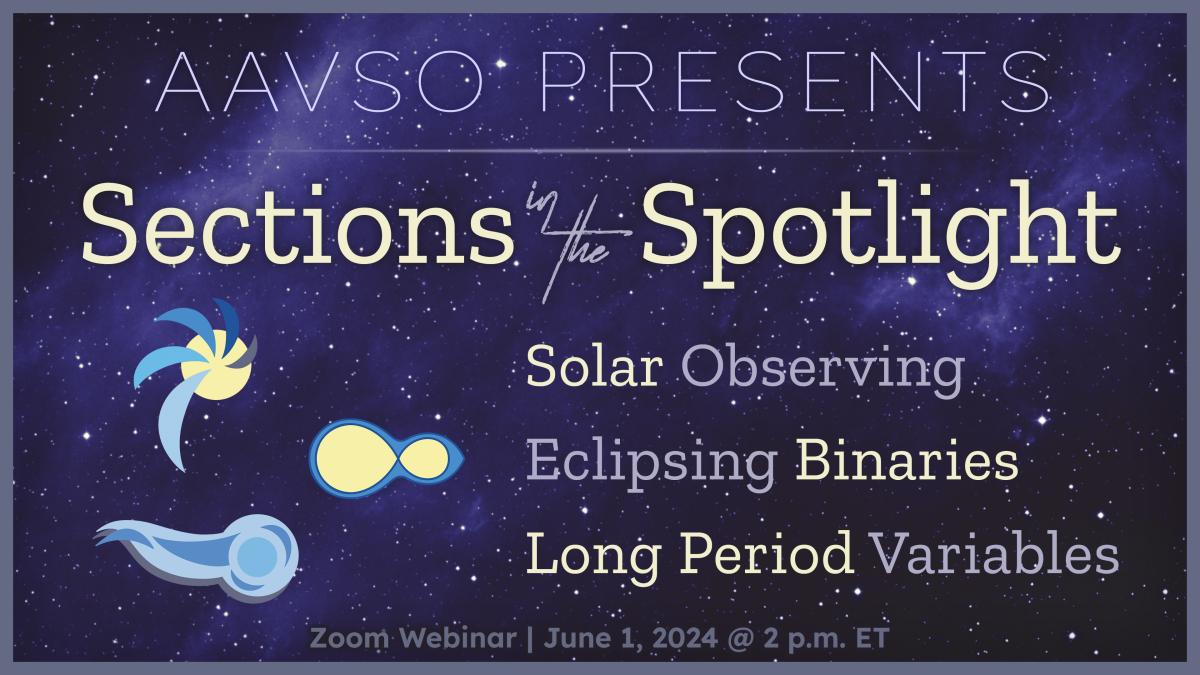
This webinar will feature brief talks from three AAVSO Sections: Solar Observing, Eclipsing Binaries, and Long Period Variables.
The session will include a discussion of the AAVSO's Section system, and ways to participate.
Be sure to stick around for the interactive Q&A with the Sections' leaders!
What is a Section?
AAVSO Sections are groups of volunteers united in the study of a particular topic, such as exploding stars or precision spectroscopy. Sections provide opportunities to learn, socialize, and contribute to science.
Filters and Photometric Transformations
May 11, 2024 @ 2:00 p.m. Eastern Time
Join Dr. Brian Kloppenborg, AAVSO's Executive Director, as he traces the journey of light from the stars to our sensors.
The presentation will explore the impacts atmospheric transmission, telescope optics, and sensor technologies have on stellar photometric data, as well as how photometric filters and transformation processes serve to standardize measurements across observers.
Brian will discuss the most common photometric systems used by amateur astronomers, present transmission curves of a variety of commercially available filters, and discuss how you can use transformation to improve the quality of your photometry.
Cataclysmic Variables
April 13, 2024 @ 2:00 p.m. Eastern Time
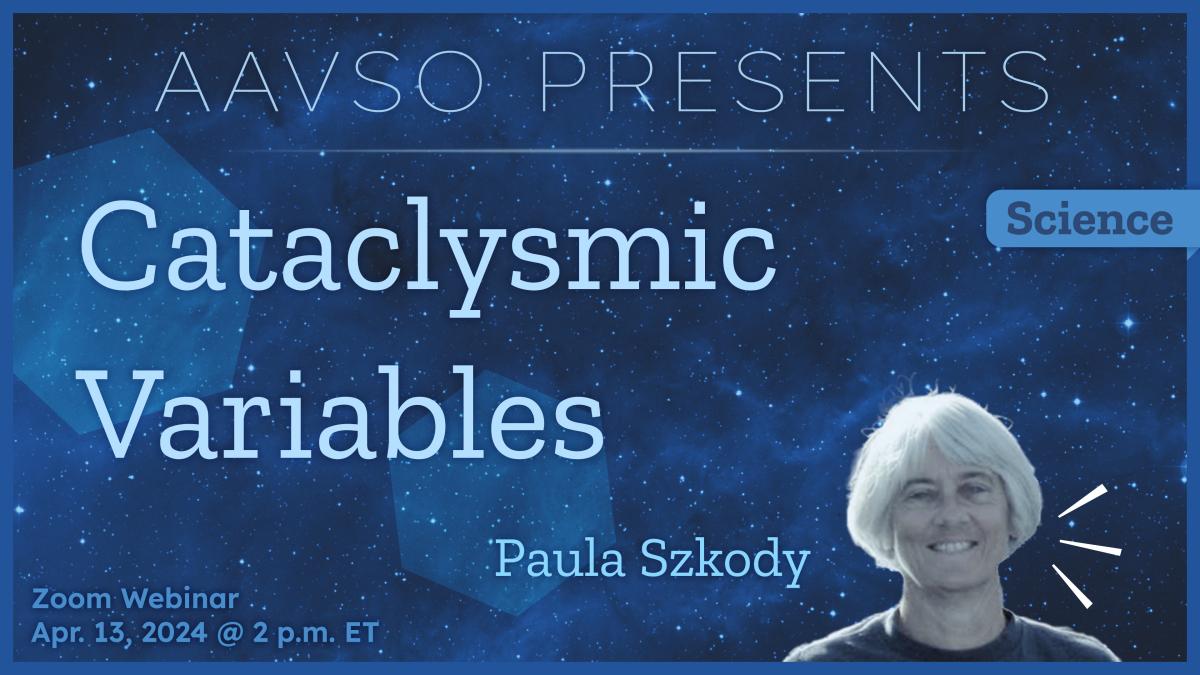
While all cataclysmic variables contain the same basic component stars (a white dwarf and a close companion), they can appear very different depending on individual properties like magnetic fields, accretion state, evolution state and companion type. This webinar will describe the various photometric and spectroscopic behavior that has been observed, which ones are well understood and what observations are still needed to complete our understanding of these systems.
Introductory Spectroscopy
March 9, 2024 @ 2:00 p.m. Eastern Time
In this interactive workshop, experienced spectroscopists Bob Buchheim and Scott Donnell will provide an introduction to spectroscopy of variable stars.
Scott will begin with a general introduction, targeted at those that have been contemplating getting into spectroscopy, but want to know more before diving in. Bob will then cover some of the basic terminology, providing a solid foundation for a general understanding of the field. Finally, Bob and Scott will together address the question of whether amateur spectroscopy is scientifically valuable, and the types of investigations which an amateur spectroscopist can engage in.
In true "How-To" fashion, we'll wrap up with an extended Q&A session, doing our best to answer every question submitted.
If you're interested in astronomical spectroscopy, you don't want to miss this event!
Asteroseismology
February 10, 2024 @ 2:00 p.m. Eastern Time
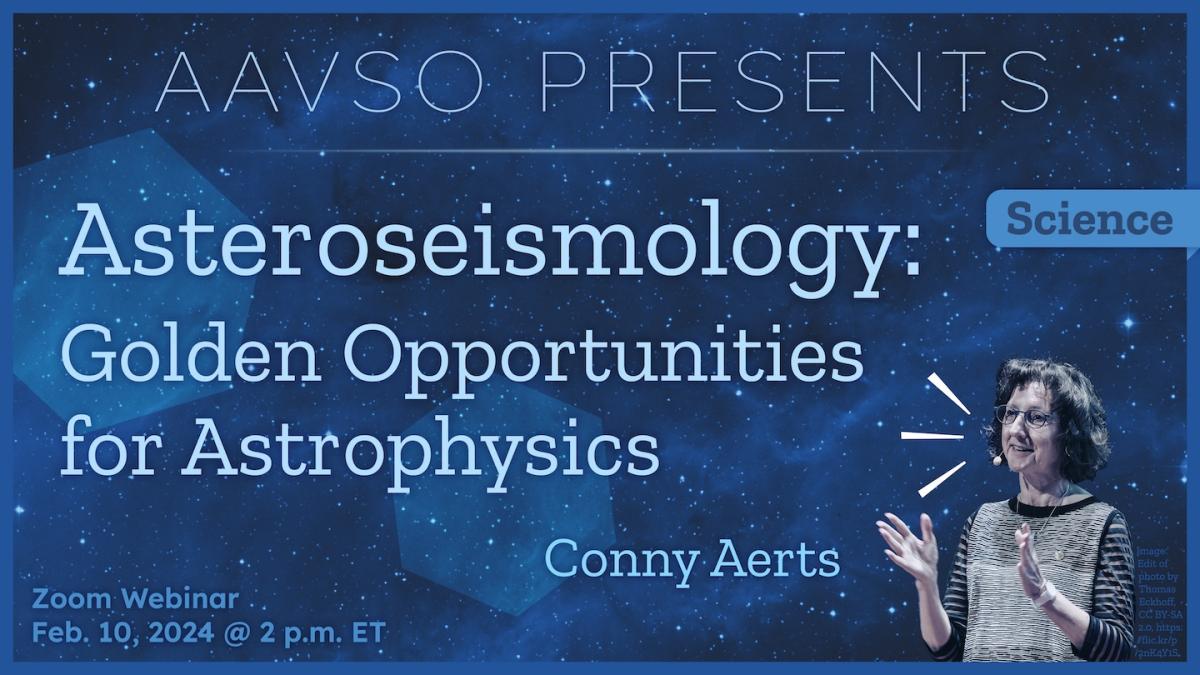
Asteroseismology has been bringing breakthrough science for more than a decade. In this webinar, 2022 Kavli laureate Conny Aerts will introduce the basic principles of asteroseismology and explain its capacity to probe stellar interiors. It will be shown how applications to sun-like stars and red giants feed exoplanetary and galactic science.
The talk will then focus on more recent applications to stars rotating much faster than the Sun. We discuss how gravito-inertial asteroseismology offers to estimate the internal rotation and chemical mixing deep inside stars, with major implications for stellar evolution. We end with exciting future opportunities for this booming research field of astrophysics from the future ESA PLATO space mission under construction.
Introductory Photometry
January 13, 2024 @ 2:00 p.m. Eastern Time
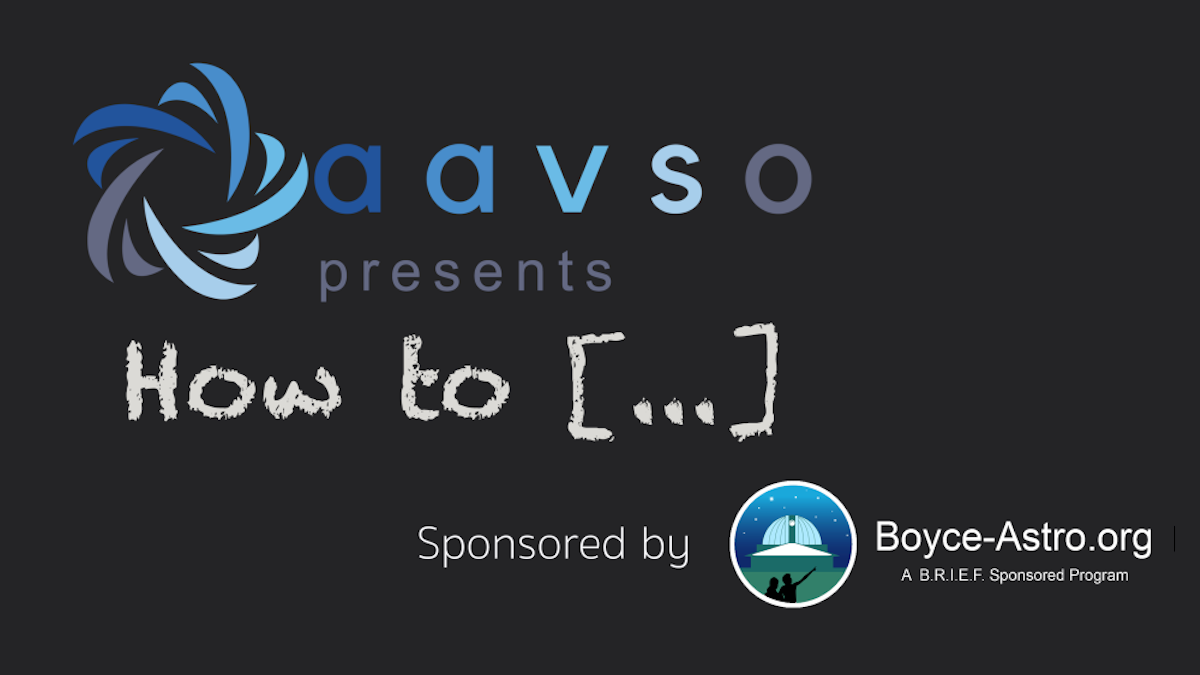
We're kicking off the new year with a webinar on one of our most popular topics—photometry! Whether you're new to variable star observing or you're an old-timer looking for ways to improve your photometric precision, this event is for you.
We'll demonstrate the process of photometric reduction, discuss important topics such as binning and choice of filters, and share how you can maximize your photometric accuracy. Afterwards, we'll wrap up with an extended Q&A session, giving attendees the opportunity to ask an expert for advice on all of your burning questions about photometry, no matter how specific.


